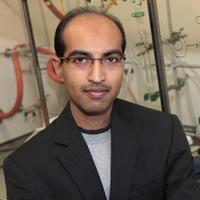-
Concerns about next month’s Hajj grow as Saudi Arabia identified as source of Sars-like outbreak
The U.K. Health Protection Agency and World Health Organization are attempting to identify a new Sars-like virus which has infected two people so far, one who has died and another who is receiving intensive care; the source of the virus appears to be in Saudi Arabia, which raises concerned that the Hajj pilgrimage next month could provide the virus a chance to spread around the world; thousands of Muslims from all over the world attend the event every year
-
-
Removing toxins from the environment

A Florida State University chemist’s work could lead to big improvements in our ability to detect and eliminate specific toxic substances in our environment; the novel approach is based on stripping electrons from the toxic chemical known as fluoride; in addition to toxin removal, the approach has many other applications
-
-
U.S. models underestimates costs of carbon pollution
Model used by government all but ignores economic damages that climate change will inflict on future generations; two economists argue that when these costs are factored in, the real benefits of carbon reduction range from 2.6 to more than 12 times higher than the government’s estimate
-
-
Precision agriculture using military technology: drones
Drones are military aircraft currently being repurposed for everyday use, especially within the growing field of precision agriculture; these flying robots allow farmers to detect changes in water content, plant health, and pesticide dispersal in their fields
-
-
Tasered youth fare as well as adults: study

Adolescents who are tasered by law enforcement officers do not appear to be at higher risk for serious injury than adults, according to new a new study; the conclusions are based on a retrospective study of Taser use from law enforcement data collected by the largest, independent multicenter database established in 2005
-
-
U.S. urgently needs better bioterrorism, disease tracking system
Nearly eleven years have passed since the fall 2001 bioterrorism-related anthrax attacks that shook the United States, killing five people and injuring seventeen, a leading bioterrorism expert says the country has still not learned its lesson; he says that current data mining approaches are passive and do not provide immediate solutions to the emergencies at hand, proposing instead an electronic, clinician-based reporting system which would have the capacity to limit the impact of a bioterrorism attack
-
-
U.S. schools not ready for next pandemic
Many U.S. schools are not prepared for bioterrorism attacks, outbreaks of emerging infectious diseases, or pandemics, despite the recent 2009 H1N1 influenza pandemic which resulted in more than 18,000 deaths worldwide
-
-
Regional, global food security effects of climate change to felt soon
Research shows that within the next ten years large parts of Asia can expect increased risk of more severe droughts, which will impact regional and possibly even global food security; on average, across Asia, droughts lasting longer than three months will be more than twice as severe in terms of their soil moisture deficit compared to the 1990-2005 period; China, Pakistan, and Turkey as the most seriously affected major producers of wheat and maize
-
-
Rinderpest: how the world’s deadliest cattle plague was eradicated
Rinderpest, the deadliest of cattle diseases, was declared vanquished in May 2011; after smallpox, it is only the second disease (and first livestock disease) ever to be eradicated from the earth; the insights gained from the eradication campaign may be applied to similar diseases that today ravage the livestock populations on which the livelihoods of one billion of the world’s poor depend; the lessons could also be applied to “zoonotic” diseases which are responsible for 2.4 billion cases of human illness and 2.2 million deaths per year
-
-
New synthesis devised for most useful, yet expensive, antimalarial drug
In 2010 malaria caused an estimated 665,000 deaths, mostly among African children; now, chemists have developed a new synthesis for the world’s most useful antimalarial drug, artemisinin, giving hope that fully synthetic artemisinin may help reduce the cost of the live-saving drug in the future
-
-
Questions raised about cost, reliability of BioWatch upgrade

One year ago, DHS said a new contract for Biowatch, a system for detecting biological attacks on the United States, would be awarded in May 2012 and would cost an estimated $3.1 billion during its initial five years of operation; now DHS has decided to postpone the plans due to concerns about cost and reliability
-
-
Government considering options for post-biolab Plum Island

The Plum Island biolab, located on an 840-acre island of the tip of Long Island, has always been shrouded in mystery owing to the sensitive nature of the biological research done in its high-security facilities; now the center is being shut down by DHS, and the government is considering several options regarding what should be done on the island and the research facility
-
-
World-wide alert for Yosemite hantavirus risk
U.S. health officials have alerted thirty-none countries that their citizens, who, as tourists, have stayed in Yosemite National Park tent cabins this summer, may have been exposed to a deadly mouse-borne hantavirus
-
-
Heat waves move toward California coasts, become more humid, imperiling health
Scientists detected a trend toward more humid heat waves which are expressed very strongly in elevated nighttime temperatures, a trend consistent with climate change projections; moreover, relative to local warming, the mid-summer heat waves are getting stronger in generally cooler coastal areas; this carries strong public health implications for the twenty-one million Californians living near the ocean whose everyday lives are acclimated to moderate temperatures
-
-
Smart agriculture will increase global food production, reduce environmental impact

Global demand for food is expected to double by 2050 due to population growth and increased standards of living; a new study, based on analysis of agricultural data gathered from around the world, offers hope that with more strategic use of fertilizer and water, we could not only dramatically boost global crop yield, but also reduce the adverse environmental impact of agriculture
-
More headlines
The long view
What We’ve Learned from Survivors of the Atomic Bombs
Q&A with Dr. Preetha Rajaraman, New Vice Chair for the Radiation Effects Research Foundation in Hiroshima and Nagasaki, Japan.
Combatting the Measles Threat Means Examining the Reasons for Declining Vaccination Rates
Measles was supposedly eradicated in Canada more than a quarter century ago. But today, measles is surging. The cause of this resurgence is declining vaccination rates.
Social Networks Are Not Effective at Mobilizing Vaccination Uptake
The persuasive power of social networks is immense, but not limitless. Vaccine preferences, based on the COVID experience in the United States, proved quite insensitive to persuasion, even through friendship networks.
Vaccine Integrity Project Says New FDA Rules on COVID-19 Vaccines Show Lack of Consensus, Clarity
Sidestepping both the FDA’s own Vaccines and Related Biological Products Advisory Committee and the CDC’s Advisory Committee on Immunization Practices (ACIP), two Trump-appointed FDA leaders penned an opinion piece in the New England Journal of Medicine to announce new, more restrictive, COVID-19 vaccine recommendations. Critics say that not seeking broad input into the new policy, which would help FDA to understand its implications, feasibility, and the potential for unintended consequences, amounts to policy by proclamation.
Are We Ready for a ‘DeepSeek for Bioweapons’?
Anthropic’s Claude 4 is a warning sign: AI that can help build bioweapons is coming, and could be widely available soon. Steven Adler writes that we need to be prepared for the consequences: “like a freely downloadable ‘DeepSeek for bioweapons,’ available across the internet, loadable to the computer of any amateur scientist who wishes to cause mass harm. With Anthropic’s Claude Opus 4 having finally triggered this level of safety risk, the clock is now ticking.”
“Tulsi Gabbard as US Intelligence Chief Would Undermine Efforts Against the Spread of Chemical and Biological Weapons”: Expert
The Senate, along party lines, last week confirmed Tulsi Gabbard as Director of National intelligence. One expert on biological and chemical weapons says that Gabbard’s “longstanding history of parroting Russian propaganda talking points, unfounded claims about Syria’s use of chemical weapons, and conspiracy theories all in efforts to undermine the quality of the community she now leads” make her confirmation a “national security malpractice.”
